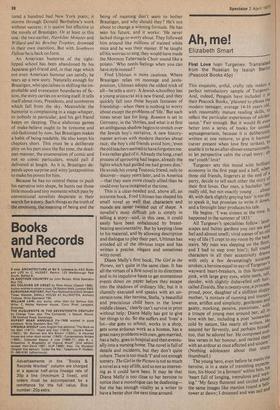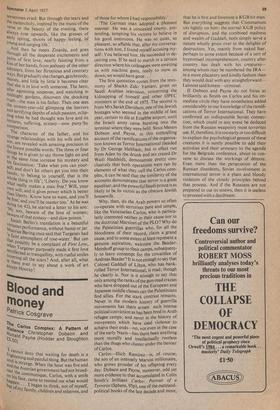Ah me!
Elizabeth Smart
First Love Ivan Turgenev. Translated from the Russian by Isaiah Berlin (Peacock Books 45p) This exquisite, artful, crafty tale makes 3 perfect introductory sample of Turgenev. And, indeed, Penguin have included it in their Peacock Books, 'planned to please the modern teenager, average 14-16 years old, with reasonably mature reading skills, ta reflect the particular experiences of adolescence.' Fair enough. But it would fit even better into a series of books for unread septuagenarians, because it is deliberatelY written at one remove, to give it humour (never present when love first strikes), t° enable it to be an after-dinner entertainment, to let perspective calm the cruel story: ah me youth! love! Turgenev sets this mood with brilliant economy in the first page and a half, when three old friends, lingerers at the end of 3 party, decide to tell each other the story of their first loves. Our man, a bachelor `not really old, but not exactly young. . • about 40, with dark slightly greying hair' is too shy to speak it, but promises to write it down, and a fortnight later produces his tale.
He begins: 'I was sixteen at the time. It
happened in the summer of 1831' A All Turgenev's specialities follow: lan''ci scapes and balmy gardens you can see , feel and almost smell ; vivid scenes of an oln way of life CI crept to my room by the back stairs. My man was sleeping on the floor, and I had to step over him'); full round characters in all their eccentricity drawn with only a few devastatingly accurat7 strokes; a heroine equal to any of Turgenev 5 wayward heart-breakers, in (his favourite) pink, with large grey eyes, white teeth, rap' slender, with slightly dishevelled soft hair, called Zinaida. She is twenty-one, a princess, proud, poor, daughter of a shiftless sloPP.Y mother, 'a mixture of cunning and insotlelci ance, artifice and simplicity, gentleness an._ gaiety, mocking, pensive, passionate,' Wit,n a troupe of young men around her., all Ifit love with her, including a poet`somel_ cold by nature, like nearly all writers. ,ut. assured her fervently, and perhaps hinisel,.. too, that he adored her. He composed enn less verses in her honour, and recited then, with an ardour at once affected and sincere. (Nothing adolescent about that sharP thumbnail.) The young hero, even before he meets the heroine, is in a state of trembling expecta• tion, his blood 'in a ferment' within him, 'heart full of longing, tremulous and wani ing,"My fancy fluttered and circled ahoiu,_ the same images like martins round a be", tower at dawn; I dreamed and was sad and sometimes cried. But through the tears and the melancholy, inspired by the music of the verse or the beauty of the evening, there always rose upwards, like the grasses of early spring, shoots of happy feeling, of Young and surging life.'
And then he meets Zinaida, and goes
through all the desperate excitements and Pains of first love, nearly fainting from a kiss of her hands, from jealousy of the other admirers, from her flirtatious and contrary Ways. But gradually shechanges, gets broody, moody, and little by little it becomes clear that she is in love with someone. The hew, after agonising suspense, and watching in midnight gardens, discovers the shocking truth—the man is his father. Then one sees the sixteen-year-old glimpsing the horrors and terrifying depths of adult passion, eclipsing what he had thought was love and its tortures, suffering, ecstasy—now puny 'by comparison.
The character of the father, and his
strange relationships with his wife and his son, are revealed with amazing precision in the fewest possible words. The three or four things he is given to say throw light on and at the same time increase his mystery and his fascination: 'Take what you can yourself, and don't let others get you into their hands; to belong to yourself, that is the Whole thing in life' ; 'Liberty. Do you know What really makes a man free? Will, your ,Tvn Will, and it gives power which is better ;nal') liberty. Know how to want, and you'll ..,°e free`, and you'll be master too.' As he was ,uYing (at 42), he started a letter to his son: My son, beware of the love of women; yeware of that ecstasy—and slow poison.' ,• Isaiah Berlin's translation is a beautiful vmirtuoso
performance, without bump or jar.
„ aurice Baring once said that Turgenev had that faint atmosphere of rose-water.' But can h Wkat P°ssibly be a complaint of First Love, When Turgenev purposely made it first love r u ec°11ected in tranquillity, with rueful smiles :-s there overing
le all the scars? And, after all, what ever to say about a work of art c-erit Hooray I







































 Previous page
Previous page